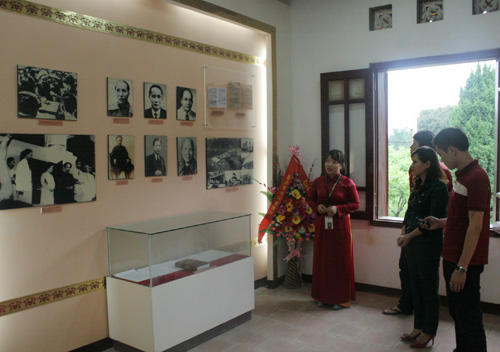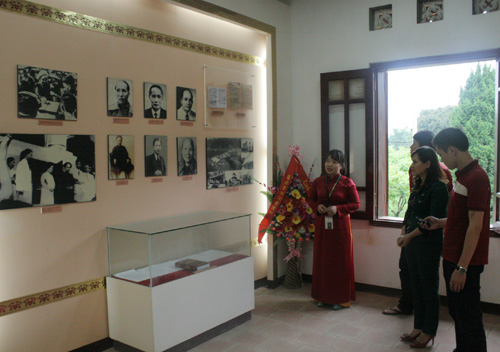
(HBO) – At Chi Ne plantation relic site where North Vietnam’s first money-printing factory was based during the war, we offered incense to a memorial dedicated to late President Ho Chi Minh, who visited the site twice.
Photo caption: Tourists
visit the money-printing factory - a relic site built by
Vietnam’s
revolutionary government.
In 1946, the Government, President Ho
Chi Minh and Finance Ministry decided to choose Chi Ne plantation (now located
in Co Nghia commune) owned by Do Dinh Thien as a money-printing factory of the
Democratic Republic of Vietnam. For the first time, banknotes of the Democratic
Republic of Vietnam were printed and circulated nationwide thanks to the
factory’s staff. Thien was a patriotic capitalist who donated his family’s
legacy to the fight for national independence and freedom. Chi Ne plantation
was also a place where Party and State high-ranking officials stopped for a
short while, including President Ho on February 19 and February 21, 1947 during
his working trip to the central province of Thanh Hoa.
Accompanied by Finance Minister Le Van
Hien and Director of the factory Pham Quang Chuc, the leader talked with
officials, workers and guards of the factory.
Dinh Thi Binh, deputy head of the
district’s relic site management board, said the factory was classified as a
national relic site by the Ministry of Culture, Sports and Tourism in 2007.
Work started on the relic site in 2010 covering
15.5 hectares with a
view to restoring the money-printing factory.
The site is currently divided into
three major areas, including a memorial dedicated to President Ho Chi Minh
which welcomes numerous visitors during holidays, a money-printing factory
(1946-1947) with two rows of artifacts and a banknote warehouse.
The factory was also named in the
Guinness Vietnam records as the first of its kind in the country./.
Huong Lan
In the spirit of "Party members go first, the people follow”, all households of Party members in the Doan Ket sub-region in Da Bac town, Da Bac district, voluntarily removed gates and fences, and donated land when the road expansion project passed through their properties. Inspired by their example, 68 households in the sub-region quickly followed suit, contributing over 1,400 sq.m of residential and perennial cropland to widen the main road through the residential area. The exemplary role of Party members in Doan Ket stands as a shining example of studying and following President Ho Chi Minh’s thought, morality, and lifestyle.
The Hoa Binh provincial People's Committee held a monthly meeting on May 29 to assess the implementation of socio-economic development tasks in the first six months of 2025, the progress of key projects, and some other important issues.
During his lifetime, President Ho Chi Minh always expressed his deep affection and special concern for children and youth. He once emphasized: "Caring for and educating children well is the responsibility of the entire Party and the entire people”; "First of all, the family (i.e. grandparents, parents, siblings) must do this job well”. "the Party Committees…, the Children’s Committee, the Youth Union, the education sector, and all related organizations must have specific plans to ensure children grow healthier and more progressive”. His teachings has been remaining valuable and serving as the guiding principles in the work of protecting, caring for, and educating children. In line with this ideology, Hoa Binh Province has continuously been prioritizing and investing resources in the well-being of children in recent years.
Mr. Nguyen Phi Long, the alternate Member of the Party Central Committee and Secretary of the Provincial Party Committee chaired the meeting of the Standing Committee of the Provincial Party Committee to provide opinions on several investment projects within the province. There was the attendance of Ms. Bui Thi Minh, the Permanent Deputy Secretary of the Provincial Party Committee and Chairwoman of the Provincial People’s Council; Mr. Bui Đuc Hinh, the Deputy Secretary of the Provincial Party Committee and Chairman of the Provincial People’s Committee and other members of the Standing Committee; the leaders from other departments, agencies, and some localities.
The Standing Board of the Vietnam Fatherland Front (VFF) Committee of Hoa Binh province held a meeting on May 28 to honour outstanding village elders, village heads, and reputable individuals from local ethnic minority and religious communities.
In mid-May, the provincial Museum organised an exhibition named "Duoi la co Dang Cong san Viet Nam quang vinh” (Under the flag of the glorious Communist Party of Vietnam). This meaningful activity took place in the joyful atmosphere to celebrate the country's major holidays and the Party congresses at all levels for the 2025-2030 term, towards the 14th National Party Congress.



